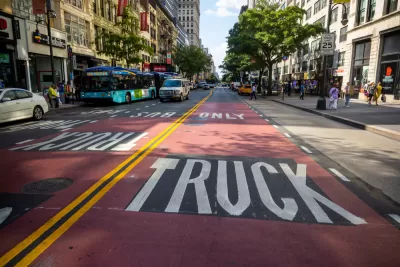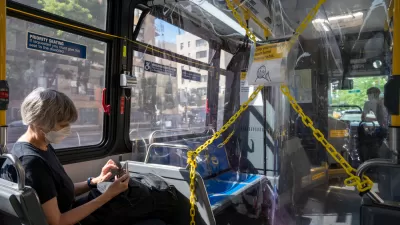An ambitious program to add 20 miles of bus lanes and protected bus ways in the city of New York has been diminished by political opposition in parts of the city.

The New York City Department of Transportation has bowed to Staten Island car owners who objected to a bus lane project, reports Gersh Kuntzman.
The scaled back proposal originally called for dedicated bus lanes in both directions on a 3.3-mile stretch of Hylan Boulevard, according to Kuntzman. "Instead of bus lanes on both side of Hylan between Lincoln and Nelson avenues, the plan now calls for a 1.4-mile bus lane on the south side of Hylan, between Lincoln and Guyon avenues."
Kuntzman notes that the scaled back version of the Staten Island bus lane project is "the second high-profile pullback from a supposed commitment to help long-suffering transit riders in as many weeks." The first: a car-free .3-mile stretch in Flushing that has been suspended indefinitely "after Council Member Peter Koo claimed, in racially supercharged language, that the busway would hurt local businesses, explains Kuntzman. Kuntzman makes sure to point out that the idea that bus lanes hurt local businesses is a myth, "dispelled by DOT’s own statistics."
Councilmembers Steven Matteo and Joe Borelli of Staten Island were responsible for the revised plan for the Hylan Boulevard in Staten Island, according to Kuntzman, who cites an article by the Staten Island Advance for the original news about this particular bus project's demise.
In June, Mayor Bill de Blasio announced plans to roll out an ambitious program of new bus lanes and protected busways around the city to assist transit riders during and after the pandemic, but as reported recently, much of that promise has stalled or, as in the case of these two projects, been scaled back or suspended entirely.
FULL STORY: ANOTHER TRANSIT DEBACLE: DOT Guts Its Own Bus Lane Project

Planetizen Federal Action Tracker
A weekly monitor of how Trump’s orders and actions are impacting planners and planning in America.

Map: Where Senate Republicans Want to Sell Your Public Lands
For public land advocates, the Senate Republicans’ proposal to sell millions of acres of public land in the West is “the biggest fight of their careers.”

Restaurant Patios Were a Pandemic Win — Why Were They so Hard to Keep?
Social distancing requirements and changes in travel patterns prompted cities to pilot new uses for street and sidewalk space. Then it got complicated.

California Homeless Arrests, Citations Spike After Ruling
An investigation reveals that anti-homeless actions increased up to 500% after Grants Pass v. Johnson — even in cities claiming no policy change.

Albuquerque Route 66 Motels Become Affordable Housing
A $4 million city fund is incentivizing developers to breathe new life into derelict midcentury motels.

DC Area County Eliminates Bus Fares
Montgomery County joins a growing trend of making transit free.
Urban Design for Planners 1: Software Tools
This six-course series explores essential urban design concepts using open source software and equips planners with the tools they need to participate fully in the urban design process.
Planning for Universal Design
Learn the tools for implementing Universal Design in planning regulations.
Heyer Gruel & Associates PA
JM Goldson LLC
Custer County Colorado
City of Camden Redevelopment Agency
City of Astoria
Transportation Research & Education Center (TREC) at Portland State University
Camden Redevelopment Agency
City of Claremont
Municipality of Princeton (NJ)




























